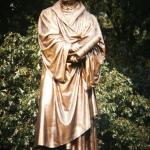Miroslav Volf, Professor at Yale, on the dedication page of his new book — Allah: A Christian Response, says this:
To my father, a Pentecostal minister who admired Muslims, and taught me as a boy that they worship the same God as we do.
 Volf’s quest is to build a theological basis for peaceful co-existence and peaceful cooperation among Muslims and Christians, and his quest is to contend that the God of the Christians and the God of the Muslims is the “same” God.
Volf’s quest is to build a theological basis for peaceful co-existence and peaceful cooperation among Muslims and Christians, and his quest is to contend that the God of the Christians and the God of the Muslims is the “same” God.
Our worship, broadly defined, reveals the character of God. Volf argued in our previous post (actually in a previous part of the book that we sketched in the previous post) that common worship patterns reveal a common God.
Volf next studies “The Same God and the Matter of Practices,” and here he will infer from practice to one’s God.
Volf begins with “practical atheists,” people for whom, whatever they believe about God, have practices that ignore or deny God. And not only this, but Jesus would say false worship/practice indicates a false god. Violent people evince a false god. Here the upshot becomes not so much the “same” God but whether or not they worship the “true” God.
This of course sets up a major, major discussion. Does right/true practice indicate worship of the true God whether one knows it or not?
Volf seems to indicate that he thinks so, but he begins by talking about “deficient theists.” Who believe in the true God but do so in a flawed way. Muslims, from a Christian perspective, may have a deficient view of God but worship the one true God nonetheless.
Those who love their neighbor are “worshiping” the one true God. (He says this is not a statement about salvation.) All genuine love is from God, regardless of who practices it.
Conclusions:
1. A pattern of wrong practices overshadows correct beliefs.
2. Wrong beliefs about God do not invalidate right practices.
So, also these:
1. To the extent that Christians and Muslims embrace the normative teachings … about God, they believe in a common God.
2. To the extent they strive to love God and neighbor, they worship the same true God.
Yes, he says, there are important differences. But their God is sufficiently similar to say they have the same God.
Agree or disagree?















